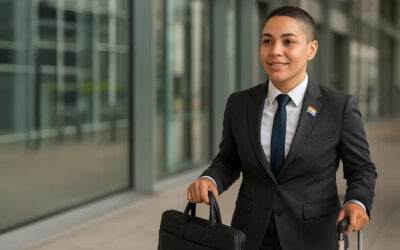Do You Know About Blended Travel?
Blended travel – often referred to by the portmanteau “bleisure” (business + leisure) – is the art of combining work trips with personal leisure activities. It’s a trend that has exploded in popularity over the past few years, perhaps unsurprisingly with jobs becoming increasingly flexible, remote work tech evolving, and employees growing more mindful of their mental health and work-life balance.
But how does blended travel work? What are the benefits for both employees and employers? And what challenges might you face if you decide to include bleisure in your travel policy? We explore all of these questions and more in this comprehensive guide to the growing trend.
1
What Exactly is Bleisure?
On the surface, bleisure is simple: A marketing executive flying to Barcelona for a three-day industry conference chooses to extend their stay over the weekend, giving them the chance to explore La Sagrada Familia, Park Güell, to enjoy the local tapas. A Sales Manager travelling to a meeting in New York decides to bring his family along on the trip so they can visit Times Square like they’ve always wanted. It’s all about balance.
The concept has gained traction over the last few years, especially since the COVID-19 pandemic, due to advancements in remote work technology, changing workforce preferences, and a greater emphasis on work-life balance. It can take numerous forms:
Extending Business Trips
Employees attending a conference, meeting, or client visit may add extra days before or after their official duties to explore the destination.
Working Remotely
Some professionals opt to set up their laptops at a resort, beachside café, or scenic countryside retreat while fulfilling their work responsibilities.
Family & Companion Travel
Business travellers can bring their families or partners along on work trips, turning a professional commitment into a mini-holiday.
Digital Nomad
With fully remote work becoming more accepted, some individuals are adopting a nomadic lifestyle, constantly travelling while working.
2
What are the Benefits of Blended Travel?

For EMPLOYEES
- Cost Savings: When business travellers extend their stay for leisure, their flights and some other expenses may be covered by their employer, reducing personal costs.
- A Better Work-Life Balance: Business travel can be exhausting, with packed schedules, back-to-back meetings, and little time for relaxation. By integrating leisure time into a work trip, employees can decompress, enjoy their surroundings, and reduce stress.
- Reduced Stress and Burnout: According to a survey from HR Grapevine, 35% of employees believe that blended travel helps them manage stress and maintain better mental and physical health routines.
- Opportunities for Personal Growth: Travel indeed broadens the mind. Visiting new places for both work and pleasure is a great way to experience new cultures on both sides of the coin.

For EMPLOYERS
- Higher Employee Satisfaction: Blended travel is a great work benefit. Organisations that include bleisure in their travel policy might be able to attract top talent or retain their current employees more easily.
- Increased Productivity: Employees who incorporate leisure into their business travel may return to work more refreshed, motivated, and productive. This, in itself, can be a justification of travel costs.
- Cost Effectiveness: Employees who combine business and leisure travel might opt for cheaper mid-week flights or extend their stay to take advantage of lower off-peak fares, ultimately reducing airfare costs for the employer.
- Strengthened Business Relationships: Blended travel encourages employees to take their time in a destination, potentially allowing for additional networking opportunities. This could lead to higher ROI from trips.
Bleisure Stats
%
of business travellers planned to add personal travel days to a work trip in 2024 according to the Global Business Travel Association (GBTA).
employees said they intend to travel more frequently due to more flexible work schedules according to research from Morning Consult.
%
of surveyed employees planned to work remotely from a holiday destination in 2024 according to a TripIt study.
3
What are the Challenges Surrounding
Blended Travel?
Setting Work-Life Boundaries
Without proper boundaries, employees may work late into the evening or constantly check emails during personal trips, leading to burnout. Establish structured work hours, communicate availability to colleagues, and set aside dedicated downtime to disconnect. Make use of time-blocking or setting “out of office” notifications during non-working hours to help maintain a balance.
Conflicting Employer Policy
Not all companies fully support bleisure policies. Employees should seek clarity on what expenses are covered or whether remote work from another location is permitted. Some organisations may require pre-approval for remote work, while others might have restrictions on international travel due to data security risks. It is crucial to understand these policies in advance.
Tax & Legal Implications
Working remotely in another country—even temporarily—can trigger tax obligations, visa restrictions, or other legal concerns. Some countries have specific rules for foreign remote workers, requiring special visas or even local tax payments if a person stays beyond a certain number of days. Consulting with a tax or legal advisor may be necessary to avoid unexpected liabilities.
Insufficient Tech Infrastructure
Reliable internet and access to company systems are essential for remote work, yet connectivity can be unpredictable in certain locations. Slow Wi-Fi, restricted access to work servers, or inadequate cybersecurity measures all need to be considered. Research internet speeds, consider backup options such as mobile hotspots, and check whether their company requires VPNs or other security protocols.
Luxury Travel Expertly Delivered
Ventur Luxury, our bespoke luxury travel service, are the experts in designing tailor-made holiday experiences with you at the heart. So, whether you’re looking for sun-drenched spots for the family, intimate honeymoon hideaways, adrenaline-pumping adventures, exclusive private island retreats or anything else, Ventur Luxury have got you covered.
Blended Travel – or “Bleisure” – Can be Beneficial to Both Employees and Employers
Blended travel is changing the way professionals approach business trips, merging professional responsibilities with personal leisure. As remote and hybrid work arrangements become the norm, this trend is expected to grow, offering significant benefits for employees and employers alike. By embracing bleisure companies can foster greater employee satisfaction, improve productivity, and position themselves as forward-thinking organisations that see the importance of a good work-life balance.
Indeed, blended travel is expected to continue growing. According to a 2023 Global Business Travel Association (GBTA) survey, 62% of business travellers are more frequently blending business and personal travel compared to 2019, while a study by Expedia found that 78% of business travellers have extended a work trip for leisure at least once in recent years.
When implemented effectively, blended travel can lead to higher job satisfaction, increased productivity, and a more engaged workforce. Employees may benefit from improved work-life balance and greater flexibility, while employers could see stronger retention rates and a more motivated team. However, success depends on clear policies, strong remote work infrastructure, and addressing challenges such as legal compliance and technology differences. As this trend evolves, businesses that carefully navigate both the opportunities and obstacles of blended travel may find themselves ahead of the game.
Related Articles
Travel Talks – LGBT+
In this episode of our award-winning webinar series, Brit Clayton, Gray Dawes Travel’s Diversity and Inclusion Manager, and Sophie Taylor, Chief Technical Officer, discuss their own business travel experiences and share 𝘁𝗼𝗽 𝘁𝗶𝗽𝘀 𝗳𝗼𝗿 𝗟𝗚𝗕𝗧+ 𝘁𝗿𝗮𝘃𝗲𝗹𝗹𝗲𝗿𝘀, helping you navigate the world with confidence.
Beyond the Boardroom
Unlocking the Future of Business Travel For too long, business travel has been misrepresented as the exclusive domain of C-Suite executives and international flights. But the Business Travel Association (BTA) saw a different picture emerging - one rooted in everyday...
How Do Gen Z Travel for Business?
As more and more members of Gen Z enter the workforce, businesses want to understand what makes them tick and tap into their potential as new employees and customers. For Gen Z, business travel isn’t just about meetings and clocking miles – it’s about purpose. In this blog, we explore how Gen Z might approach business travel differently from previous generations, what values influence their travel behaviours, and the key takeaways for travel managers and bookers looking to serve them better.
LET’S TALK
Fill in the form below and we’ll get back to you as soon as we can.




